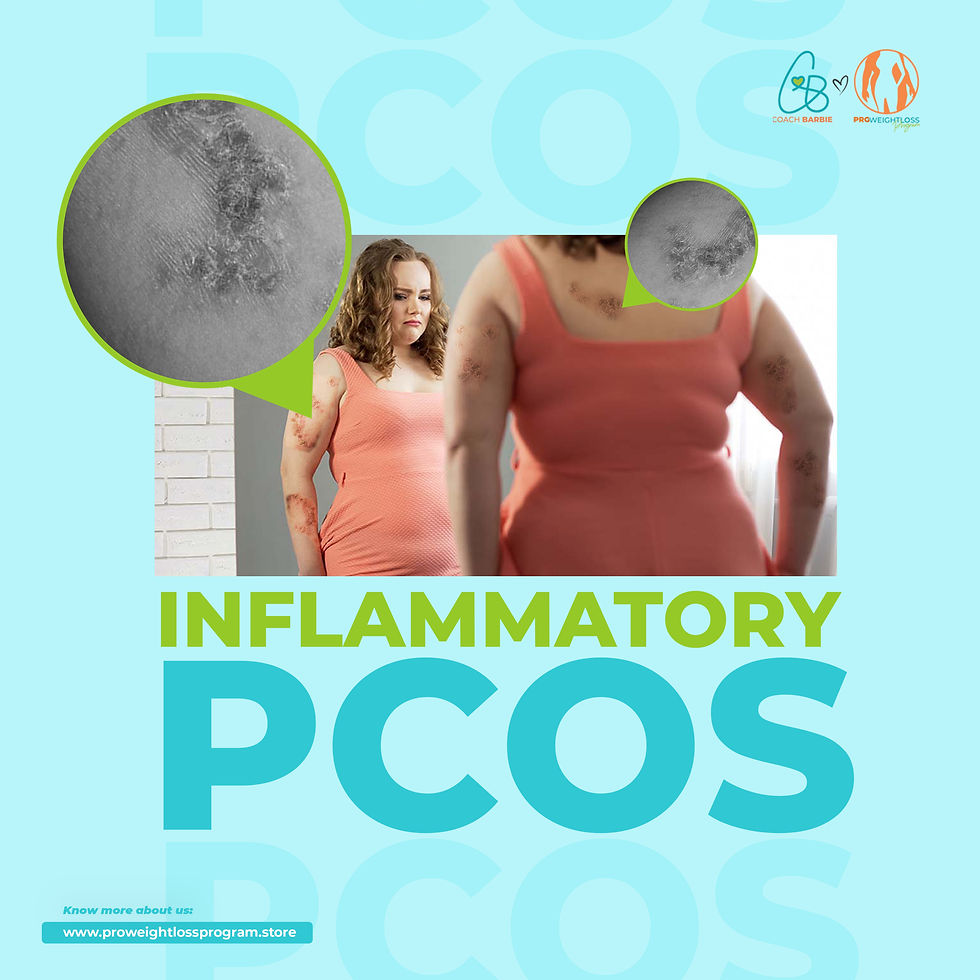The 4 Types Of PCOS (And How To Support Them)
- Proweightloss Program

- Apr 9, 2021
- 4 min read
Despite its name— it doesn’t actually have a whole lot to do with cysts on the ovaries. Although it’s a condition that affects our hormones, PCOS has roots in metabolic health, inflammation, and adrenal function.
The good news is that PCOS is not a chronic condition, but one that can be healed, reversed, and overcome with the right diet, lifestyle, and nutritional support.
Here’s what you need to know about the 4 different types of PCOS and how to support each of them:
1. INSULIN-RESISTANT PCOS

Insulin-resistant PCOS is the most common type of PCOS and is the result of high levels of insulin in the body - which can also be referred to as metabolic syndrome or pre-diabetes.
Insulin resistance is what happens when the cells in your muscles, fat, and liver stop responding well to insulin, which increases blood sugar levels and forces your pancreas to pump out even more insulin.
Higher levels of circulating insulin increase the production of androgens in women which interferes with ovulation and leads to all of the other fun symptoms of high androgens listed above.
How will I know if this is me?: Along with the signs of androgen excess, insulin-resistant PCOS can also cause fatigue, brain fog, frequent thirst and urination, and weight gain around the middle. If these signs resonate with you, ask your healthcare professional about testing your insulin levels.
To support insulin-resistant PCOS:
Eat a lower-carb diet that’s rich in healthy fats and quality proteins to help manage insulin levels.
Move your body daily with either low-intensity exercise or resistance training to improve insulin sensitivity.
Supplement with nutrients that also help to support insulin sensitivity, such as magnesium and probiotics.
2. POST-PILL PCOS

If your signs of PCOS started a few months after coming off oral contraception, it may simply be a temporary state related to a surge of androgens that are produced as your ovaries kick into gear again.
Oral contraceptives that contain an androgen-suppressing form of progestin such as Yasmin, Yaz or Ginet are often the worst offenders in this department.
Even though it's more of a temporary hormonal state than a medical condition, some women are given a PCOS diagnosis during this time.
How will I know if this is me?: If you have ruled out insulin resistance, and started experiencing signs of higher androgens within 6 months of coming off hormonal contraceptives, you are most likely dealing with post-pill PCOS.
Post-pill PCOS will generally heal within a few months to a year when supported with the right diet, lifestyle, and nutritional support.
To support post-pill PCOS:
Supplement with quality forms of zinc and vitamin B6. These two nutrients nourish the ovaries and support ovulation. Zinc also helps to calm inflammation and prevents bacteria from growing on the skin.
Manage your stress levels by reducing stressors such as caffeine, alcohol, and intense exercise (often easier said than done, we know).
Eat plenty of cruciferous vegetables, such as broccoli, cauliflower, kale and Brussels sprouts which contain a potent phytonutrient called DIM, that supports estrogen detoxification helps to balance androgens.
Take a deep breath and know that this is just a phase. Once your ovaries and hormones find their natural rhythm again your androgens will most likely fall back to normal levels.
3. INFLAMMATORY PCOS

Inflammatory PCOS is where chronic inflammation in the body is the primary driver of elevated androgens.
High-level inflammation stemming from an overactive immune system can stimulate the ovaries to make too many androgen hormones, which can interfere with ovulation and lead to irregular periods.
How will I know if this is me?: Someone with inflammatory PCOS does not experience signs of insulin resistance, however, they may experience other signs related to high levels of inflammation, such as:
Persistent fatigue that isn’t remedied with sleep;
IBS-type bowel irregularities;
Headaches;
Joint pain;
Skin conditions such as eczema, hives, or psoriasis
To support inflammatory PCOS:
Identify and eliminate foods you are intolerant or sensitive to, the most common offenders are usually gluten and dairy.
Reduce your exposure to environmental toxins such as pesticides, plastics, and conventional skincare, beauty, and household cleaning products.
Look after your gut with zinc, collagen, l-glutamine, and probiotic-rich foods.
Supplement with magnesium to support sleep and help to calm your nervous system.
4. ADRENAL PCOS
The final type of PCOS is not driven by insulin resistance, hormonal contraceptive use, or inflammation, but rather the body’s response to stress.
Women with adrenal PCOS are either experiencing high levels of stress, or their bodies are reacting abnormally to stress. In either case, they will have high levels of DHEAS—an androgen produced in the adrenal glands— and normal levels of other androgens produced in the ovaries—such as testosterone and androstenedione.
How will I know if this is me?: If you have ruled out insulin resistance, and testing shows only your DHEAS is elevated and not your other androgens, then you are most likely dealing with adrenal PCOS.
To support adrenal PCOS:
Prioritize sleep and aim for a minimum of 8 hours per night, to help your body heal and reset stress hormone production.
Supplement with magnesium, to nourish your nervous system and support mind and body relaxation.
Start a meditation practice. Meditation is the ultimate practice and tool for quieting your mind, reducing stress levels, and increasing self-awareness—all of which have powerful benefits for both mental and physical health.
Like you, I also experience having this kind of symptoms and PCOS on my body.
And now, with the help of probiotics and through fixing my nutrition I became PCOS FREE!
You can do it too.
I'm here to help you.
Know more about the benefits of taking a probiotic supplement: https://www.proweightlossprogram.store/post/how-probiotics-helps-with-pcos
Let me know what I can do for you sis 😃❤
Love,
Coach Barbie














Comments